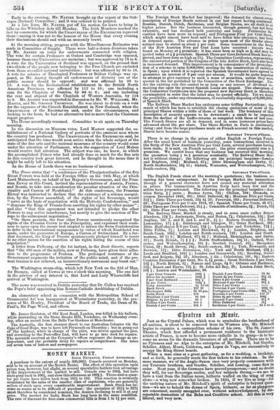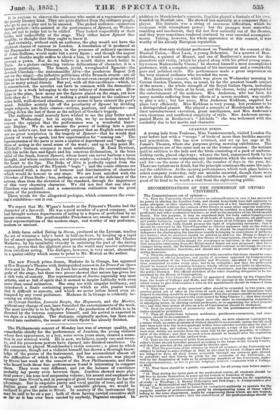ttratrtg ant Zuoir.
Just as the Crystal Palace, which was to symbolize the brotherhood of all nations, is about to be removed from its Western site, Mr. Mitchell begins to organize a cosmopolitan scheme of his own. The St. James's Theatre, which first afforded a permanent residence to the histrionic artists of France, is now to become more catholic in its grasp—is to be- come an arena for the dramatic literature of all nations. There are to be no Pyrenees and no Alps to the enterprise of Mr. Mitchell, but Goethe, Schiller, Alfieri, Monti, Calderon, and Lopez de Vega, are successively to oceupy the King Street boards. When a man aims at a great gathering, as for a wedding, a birthday, and so fortln he generally sends the first tickets to his relations. In the same manner, we of the Anglo-Saxon race very properly commence with our Teutonic brethren, and Goethe, Schiller, and Leasing, come first in order. Next year, if the Germans have proved prosperous,—and no doubt they will, for our Sovereign smiles, and her subjects throng,—we are to have a visit from the Italian muse, hitherto wafted on the wing of song alime—a wing now somewhat broken. In 1854, if we live so long—for the undying nature of Mr. Mitchell's spirit of enterprise is beyond ques- tion—we are to behold the drama of Spain, hitherto, as far as playgoers are concerned, merely smuggled over, without acknowledgment, by dis- reputable dramatists of the Behn and Centlivre school. All this is very liberal, and very new.
It is (anions to observe the audience who assist at a representation of the purely literary kind. They are quite distinct from the ordinary people, who go to see a play and to be amused. The picked audience—numerous though picked—who assisted at the performance of Egmont, on Wednes- day, sat not to judge but to be edified. They looked respectfully at their books, and respectfully at the stage. They either knew Egmont tho- roughly, or thought that they ought to know it. And certainly, without such an audience, the play would not have the slightest chance of success in London. A translation of it produced at the Haymarket or the Princess's, in the presence of ordinary specimens of John-Bullism, would make but a sorry figure ; and though the august name of Goethe might suffice to check a hiss, it would not be enough to prevent a yawn. Nor do we believe it would thrive much better in paria. As a picture embracing various delineations of character, it is a literary masterpiece. The honest, jovial, wrongheaded Egmont—the devoted Clarchen—the statesmanlike Alva—the ponderous Regent (left out on the stage)—the talkative politicians of the Brussels streets—are all beings to know familiarly and to love (we do not even except grim old Alva) like so many actual friends. But yet, with all this excellence—which, be it remembered, the novelist can have in common with the dramatist— _Egmont is a work belonging to the very infancy of dramatic art. How large is the plan, how many are the figures placed on the stage yet how little they do ! The notion of making a grand appeal to the audience by some bold, well-devised situation, never seems to have entered the poet's mind. Schiller acutely hit off the peculiarity of Egmont by dividing tragic subjects into three classes—actions, passions and character—and setting down the last of these as the subject of Goedie's tragedy. The audience could scarcely have washed to see the play better acted than on Wednesday ; but in saying this, we by no means intend to convey the opinion that the performance was a wonderful histri- onic display. We do not assume the power of looking into a piece with an actor's eye, but we shrewdly suspect that an English actor would see no great temptation in the tragedy of Egmont—that he would find plenty of words to speak, but few opportunities for "coming out." The representation of the parts is more a matter of deportment and "make-up" than of acting in the umal sense of the word ; and up to this point Mr. Mitchell's German company is most satisfactory. M. Emil Devrient, with his noble face and figure and his sonorous declamation, is the beau ideal of the frank, honest Egmont, whose heart can never harbour a mean thought, and whose sentiments are always ready—too ready—to leap from the heart to the lips. The Duke of Alva is perfectly copied from the authorized portraits of the Flemish " bogie " ; and the comic citizens are represented with a degree of humour and discrimination of character which would do honour to any stage. We are least satisfied with the Clarchen of Frau Stolte ; less, perhaps, on account of the deficiency of the actress, than from the elevation of the standard, through the importance of this very charming character. We did not feel that our idea of Cliirchen was realized; and a conscientious realization was the great charm of the performance.
Three words for the allegorical prologue, which commences the even- ing's exhibition—cut it out.



























 Previous page
Previous page